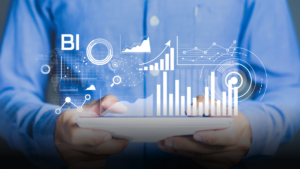In today’s rapidly evolving digital landscape, businesses are constantly seeking innovative ways to enhance their return on investment (ROI). One of the most powerful tools in this quest is Business Intelligence (BI). By leveraging BI in social selling, companies can transform raw data into actionable insights, driving significant improvements in their sales strategies. This article explores how integrating BI into social selling can maximize ROI, with a focus on key aspects such as data analytics, customer relationship management (CRM), and predictive analytics.
The Power of Business Intelligence in Social Selling
Business Intelligence encompasses a range of technologies and methodologies that transform raw data into meaningful and useful information. In the realm of social selling, BI tools can provide sales teams with critical insights into customer behavior, preferences, and trends. This allows for more informed decision-making and personalized sales approaches, ultimately leading to higher conversion rates and increased revenue.

Leveraging Data Analytics for Enhanced Sales Strategies
Data analytics is at the heart of BI, enabling businesses to analyze vast amounts of data to uncover patterns and insights. In social selling, data analytics can be used to track and measure the effectiveness of various sales strategies. By analyzing data from social media interactions, companies can identify which tactics are resonating with their audience and which ones need adjustment.
For instance, data analytics can reveal the best times to post content, the types of messages that generate the most engagement, and the social platforms that yield the highest conversion rates. This level of insight allows businesses to fine-tune their sales strategies in real-time, ensuring they are always operating at peak efficiency.
Enhancing Customer Relationship Management with BI
Customer Relationship Management (CRM) systems are integral to successful social selling. By integrating BI tools with CRM systems, businesses can gain a deeper understanding of their customers. BI enhances CRM by providing a comprehensive view of customer interactions and preferences, enabling more personalized and effective communication.
With BI-powered CRM, sales teams can track customer journeys from initial contact through to purchase and beyond. This holistic view helps in identifying opportunities for upselling and cross-selling, as well as predicting future buying behaviors. Moreover, BI can automate many CRM tasks, freeing up sales teams to focus on building relationships and closing deals.
Predictive Analytics: Anticipating Customer Needs
Predictive analytics, a key component of BI, uses historical data to forecast future outcomes. In social selling, predictive analytics can anticipate customer needs and behaviors, allowing businesses to proactively address them. This not only improves customer satisfaction but also increases the likelihood of conversions.
For example, predictive analytics can identify potential leads who are most likely to convert, enabling sales teams to prioritize their efforts. It can also forecast market trends, helping businesses to stay ahead of the competition by adapting their sales strategies accordingly.
Integrating Sales Automation for Efficiency
Sales automation is another crucial element of maximizing ROI in social selling. By automating repetitive tasks such as lead generation, follow-ups, and data entry, businesses can streamline their sales processes and improve efficiency. BI tools can integrate seamlessly with sales automation platforms, providing real-time insights that enhance the effectiveness of automated workflows.
Automated systems can also track and analyze sales data continuously, offering valuable insights into sales funnels and identifying bottlenecks that may be hindering progress. This continuous feedback loop ensures that sales strategies are constantly being refined and optimized.
Utilizing Data Visualization for Clear Insights
Data visualization is a powerful feature of BI that transforms complex data sets into easily understandable visual formats. In social selling, data visualization tools can help sales teams quickly grasp key metrics and trends. This enables faster decision-making and more effective strategy adjustments.
Visual dashboards can display real-time data on sales performance, customer engagement, and market trends. This immediate access to critical information allows sales teams to respond swiftly to changes and opportunities in the market.

Driving Digital Transformation with BI
The integration of BI in social selling is a key driver of digital transformation. By leveraging advanced data analytics, predictive analytics, and automation, businesses can transform their sales processes to be more data-driven and customer-centric. This digital transformation not only enhances efficiency and effectiveness but also positions companies to better compete in an increasingly digital marketplace.
Conclusion:
From data analytics to predictive analytics, the integration of Business Intelligence in social selling offers a myriad of benefits. By leveraging BI tools, businesses can gain deeper customer insights, enhance CRM systems, automate sales processes, and drive digital transformation. These advancements lead to more effective sales strategies, higher conversion rates, and ultimately, maximized ROI. As the digital landscape continues to evolve, the importance of BI in social selling will only grow, making it an essential component of any successful sales strategy.



